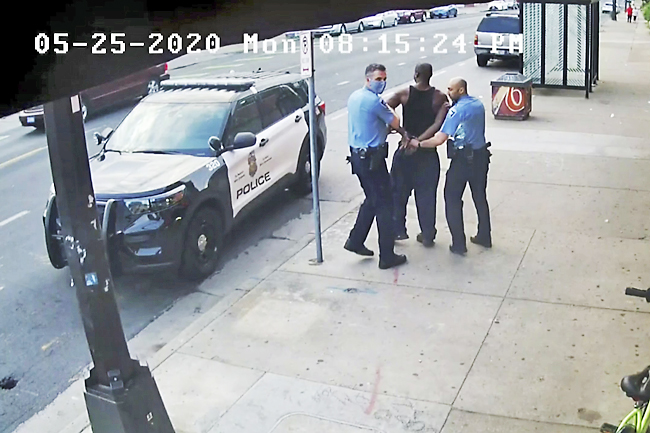ST PAUL, MINNESOTA (AP) – Prosecutors in the federal trial of three former Minneapolis police officers in George Floyd’s killing probed the department’s training on use of force, a key issue at the heart of charges that the officers violated Floyd’s civil rights.
The commander of the department’s training division testified on Thursday that officers are trained to use the least amount of force necessary and that they have a duty to intervene against inappropriate force.
Inspector Katie Blackwell said officers are required to try to de-escalate a situation and, if force is used, to stop once the person is no longer resisting, then render any necessary medical aid they’re trained to provide until medical personnel arrive.
Federal prosecutors said former Officers J Alexander Kueng, Thomas Lane and Tou Thao failed to act to save Floyd’s life on May 25, 2020, as fellow Officer Derek Chauvin knelt on the Black man’s neck for nine-and-a-half minutes while Floyd was handcuffed, facedown and gasping for air. Kueng knelt on Floyd’s back, Lane held his legs and Thao kept bystanders back. Testimony resumed yesterday.
Blackwell testified that it is critical to move someone who is being restrained from a prone position onto their side, otherwise “the concern is that they would die in custody”. Body camera video shows that Lane twice asked if they should roll Floyd onto his side but was rebuffed.

Blackwell went through department policy and the training required of all officers, and noted that Thao, who has been with the department since 2012, was certified in CPR and attended multiple hours of defensive tactics training, use-of-force training and crisis intervention training while he was on the force. Blackwell did not get into the specific training records of Lane and Kueng before testimony ended for the day.
Officers had responded to a 911 call that Floyd, 46, tried to use a counterfeit USD20 bill at a corner store. The videotaped killing triggered worldwide protests and a reexamination of racism and policing.
Whether the officers deprived Floyd of medical aid is a key element of the case, and prosecutors have sought to show jurors that responding paramedics were not given important information, and that Floyd should have been given medical attention immediately.
An emergency room physician on duty at Hennepin County Medical Center when Floyd was brought in testified on Thursday that it was too late to save Floyd.
Kueng, who is Black; Lane, who is white; and Thao, who is Hmong American, all are charged with willfully depriving Floyd of his constitutional rights while acting under colour of law. One count against all three officers says they saw Floyd needed medical care and failed to help. A count against Thao and Kueng said they did not intervene to stop Chauvin.
Both counts allege the officers’ actions resulted in Floyd’s death.
Prosecutors have argued that the “willful” standard can be met by showing “blatantly wrongful conduct” that deprived Floyd of his rights.
During opening statements, Kueng’s attorney, Tom Plunkett, said that Chauvin called “all of the shots” as the senior officer at the scene. Chauvin was convicted of murder and manslaughter in state court last year and also pleaded guilty in December to a federal civil rights charge.
Lane, Kueng and Thao also face a separate state trial in June on charges they aided and abetted murder and manslaughter.



















































